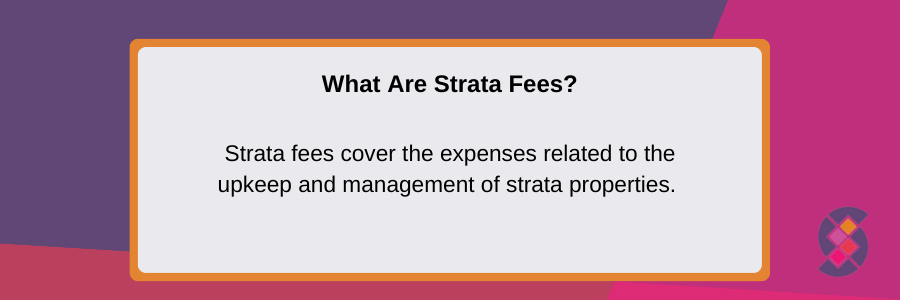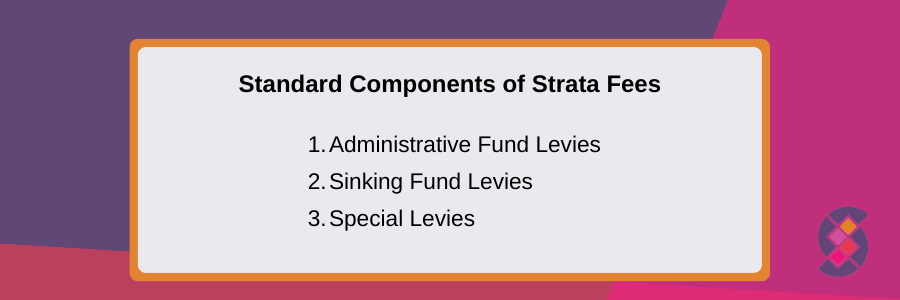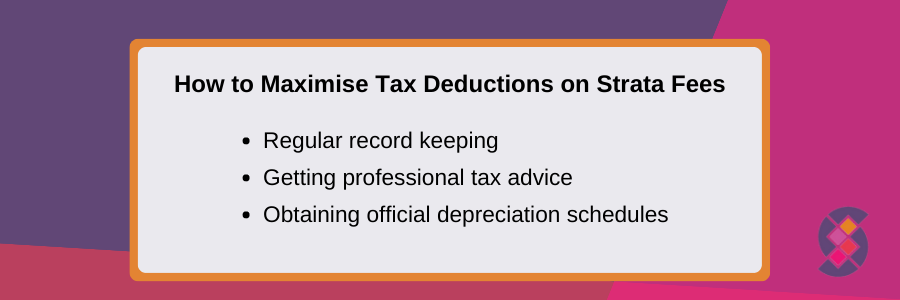Are Strata Fees Tax Deductible?
Strata fees, also known as body corporate fees, cover the expenses related to the upkeep and management of strata properties. If you’re a strata property owner, it’s essential to understand whether strata fees are tax deductible, because this can impact your financial situation. This article will discuss the tax deductibility of strata fees for both owner-occupied and investment properties.
What Are Strata Fees?
Strata payments must be made regularly by owners of strata-titled properties. These will cover the expenses associated with maintaining and managing the building’s shared areas and facilities. The strata management company will collect these fees to contribute to the continued functionality and upkeep of the property. The fees are usually collected quarterly.
Standard components of strata fees fall into three main categories:
1. Administrative fund levies
These are expenses that occur at least annually.
- Maintenance and repair
- Utility bills for shared areas
- Building insurance
- Strata management fees
2. Sinking fund levies
These are more significant expenses that occur less regularly but are generally expected and anticipated. They can include:
- Renovations
- Larger scale repairs
- Repainting
- Replacing carpets, blinds, or hot water systems
3. Special levies
These expenses are unexpected and not covered by the sinking fund. These can be significant expenses and may require strata finance loans to cover. Examples of circumstances that may require special levies include:
- Extensive storm damage
- Extensive fire damage
- Major plumbing emergencies
Ideally, there will be enough funds from the sinking fund to cover special levies, but as they are unexpected, they can catch strata owners unawares.

Understanding Tax Deductibility
Tax deductions are expenses that can be subtracted from your taxable income. Tax deductions reduce the amount of tax you must pay and are usually associated with the costs of generating income, running a business, or maintaining an investment. Tax deductions minimise your tax liability and allow you to retain more of your earnings.
Property owners may be able to claim tax deductions on expenses such as mortgage interest, rental property expenses, depreciation, property taxes, and legal or professional fees.
A building owner’s eligibility for tax deductions depends on the purpose of the strata property and which specific expenses the fees cover.
Are Strata Fees Tax Deductible for Owner-Occupied and Investment Properties?
There are two main types of strata properties: owner-occupied and investment.
Owner-occupied properties
Properties that the owner resides in as their primary place of residence and that are not used for generating rental income are not usually tax deductible. In this case, expenses like maintenance, insurance, and mortgage interest are considered personal expenses that benefit the owner-occupier and are not tax-deductible.
Investment properties
Investment properties are bought with the primary goal of generating income. They are not used for the owner’s primary residence; as such, any expenses associated with owning and maintaining them are business expenses. Investors who buy strata properties can generally claim tax deductions on mortgage interest, property management, maintenance, repair, insurance, depreciation, professional fees, and improvements to the property geared at generating income.
The main rule is that strata fees must be directly related to generating income in order for tax deductions to be successfully claimed. To ensure that you can claim tax deductions, keep a detailed record of the expenses made on your property so that you can provide details on what you’re claiming for.
Not all body corporate and strata fees are deductible, so it’s essential to consult with a tax professional to ensure you’re claiming on the correct expenses.

How to Maximise Tax Deductions on Strata Fees
To maximise tax deductions on strata and body corporate fees, consider the following strategies:
Regular record keeping
Proper record-keeping ensures an accurate record of payments, receipts, and invoices related to strata fees and property expenses. Obtaining these documents will help you claim deductions and provide the evidence needed in the case of a tax dispute or audit.
Getting professional tax advice
Beyond discussing expenses and keeping your strata management records, seek professional advice from qualified tax experts. Tax laws and regulations are complex and often change depending on many factors and circumstances. A professional can help you to navigate the tax system and develop strategies to minimise your tax liability.
Obtaining official depreciation schedules
By obtaining a professionally prepared depreciation schedule, you may be able to claim tax deductions for the wear and tear of the building over time. A depreciation schedule outlines the depreciation deductions available and ensures that you can claim the maximum amount allowed under tax laws.
Identify and claim all eligible deductions to effectively reduce your taxable income and tax liability and increase your cash flow.

Managing Your Strata Property’s Tax Deductions
Strata fees are often deductible, especially for investment properties. Understanding the tax implications of strata fees and which expenses are claimable is vital. For the best results on tax deductions and to ensure efficiency and legality, consult a tax professional and engage strata management services.
Strata Data is a professional strata building management company dedicated to ensuring the effective management of your strata property. We can ensure that your funds and fees are cost-effective and efficient and increase the value of your property. Beyond strata management and building management, Strata Data provides financial management, accounting, legal reporting, and advice; we’ll ensure you can claim the relevant tax deductions on your strata property successfully and legally. Contact our expert team today to get started on maximising the tax deductions on your strata fees.



